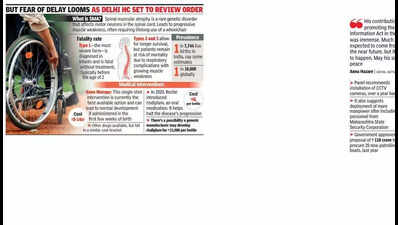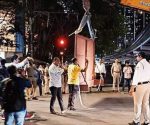Patients with rare spinal disorder closer to life-saving med for 1st time – The Times of India

Mumbai: Rustom Irani (45), an Andheri screenwriter, has been racing against time all his life. Diagnosed with type 2 spinal muscular atrophy (SMA) at 13, whose symptoms appeared earlier, he has spent decades watching his body weaken, knowing that his condition would only deteriorate.
“Every couple of months, our patient support groups get a message about a child’s death because the disease had advanced,” he says.
For Irani and over 1,000 SMA patients in India, about 200 of whom are in Mumbai, life-saving treatments remain out of reach, with medicines priced in crores. But last month, the community finally saw hope—Delhi HC allowed Natco Pharma to market a generic version of risdiplam, a drug developed by US-based Roche. While Roche’s version costs Rs 6.2 lakh per bottle, Natco promised to slash the price to Rs 15,900. One bottle lasts about a month. But the breakthrough hangs in legal limbo. Roche has appealed the verdict, and the case awaits a review by a division bench.
SMA is a rare genetic disorder that destroys motor neurons and progressively robs patients of muscle strength. Type 1, the most severe, strikes infants; types 2 and 3 manifest in childhood or adolescence; and type 4, the mildest, often appears after 30.
“It’s a lifelong treatment, and even at the proposed generic manufacturer’s price, many still can’t afford it,” says Karan Shah (31), a Dadar resident and dog trainer who was diagnosed with SMA at 17. He says it now feels like another endless wait. “The case will take time to be resolved, and for SMA patients, time is a matter of life and death,” says Shah, who lost his older brother to SMA a few years ago.
Neither Shah nor Irani has ever had access to any of the medicines. Irani says fundraising efforts often fail for adults compared to children. Both have relied on interventions like physiotherapy.
“In the absence of medication, adherence to supportive care becomes essential,” says a doctor from BMC-run KEM Hospital who works with rare disease patients. The hospital’s Centre of Excellence for Rare Diseases treats patients and helps families secure the Centre’s one-time Rs 50-lakh aid for rare diseases.
Badlapur’s Kirti Singh has been trying to get this aid since 2023, when her two-year-old daughter was diagnosed with SMA. “We’ve been told the hospital is still waiting for funds from govt,” she says. Singh says even if the aid is offered, it would only cover the cost of medicine for about one year. “We were lucky to be included in Roche’s sampling programme, which provided a six-month dose, soon after diagnosis. Since then, we’ve managed to buy medicines through fundraising, but that can last just a little longer.”
Dr Neelu Desai, a paediatric neurologist at PD Hinduja Hospital, says the drug’s generic version will be a win for patients. “The condition can’t be reversed, but the drug can prevent it from worsening.” Dr Desai had facilitated gene therapy, a one-time dose costing Rs 8-14 crore, in 13 infants in 2021. She says 10 of them survived and are doing well. “The disease in the other three had advanced by the time they received the medication.”
K M Gopakumar, senior researcher at Third World Network whose work focuses on global intellectual property rules, says if Delhi HC’s division bench upholds the single bench’s order, the generic manufacturer will be able to market it even if the global company goes to Supreme Court. “But if the generic manufacturer loses, the case will be prolonged.”
















